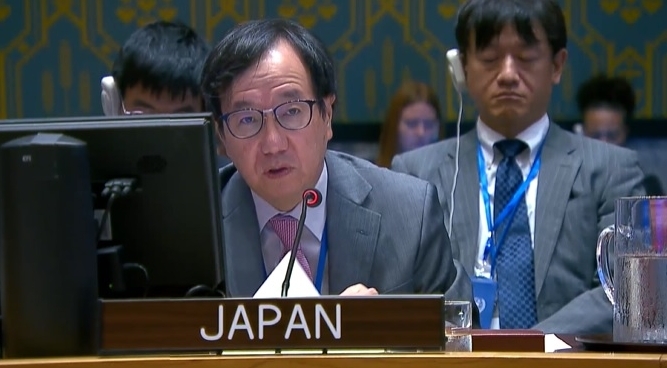Statement by H.E. Ambassador YAMAZAKI Kazuyuki, Permanent Representative of Japan to the United Nations, at the United Nations Security Council Briefing on the Situation in Libya
2024/8/20

(As delivered)
Thank you, Mr. President.
I thank Ms. Koury for her insightful briefing. I also welcome the Permanent Representative of Libya to this meeting.
Today, I would like to mention the following five points.
First, Japan remains deeply concerned about the prolonged political stalemate in Libya. National elections are a prerequisite to restore the legitimacy of state institutions. Japan notes with concern that the report by the Secretary-General clearly mentions that “there was no progress towards resolving the contested issues in the electoral laws”, and again urges all Libyan stakeholders to place the people’s aspirations above their own interest.
Second, Libya needs a fair and transparent distribution of its revenue rather than political and armed groups competing for power over resources. Japan is concerned that security risks remain present as projected by the current structural-political division in Libya. Japan reiterates the need for dialogue and confidence building between the parties that could lead to a progress in the political process. Japan also encourages UNSMIL to continue its support for the 5+5 Joint Military Commission to uphold the ceasefire agreement including the withdrawal of foreign forces, foreign fighters, and mercenaries and facilitate dialogue to establish unified, accountable, and professional military and security institutions.
Third, the humanitarian situation for migrants and refugees entering and transiting through Libya is of great concern. Human rights violations against those in official and unofficial detention facilities continue to be reported. The intensified conflict in Sudan has added more than 20,000 refugees inside Libya’s borders. While the humanitarian response provided by United Nations agencies and local authorities are commendable, the international community should shed more lights on these people in vulnerable situations.
Fourth, Japan is alarmed by the reports of systematic violations of international human rights law and excessive restrictions on civil society, women, youth, journalists, human rights defenders, and others. Regarding women’s rights and political participation, Japan aligns itself with the WPS Shared Commitment’s stakeout, which was just read out this morning outside of this Chamber.
Finally, as Libya’s difficult situation continues to require international support through the United Nations, Japan fully supports UNSMIL and the leadership of Ms. Koury. Japan also calls for the swift appointment of a new SRSG to lead the mission, building upon Ms. Koury’s ongoing work to revitalise a Libyan-led and Libyan-owned political transition process by fostering consensus and streamlining efforts.
In conclusion, I reiterate Japan’s full commitment to the Libyan people and to peace and prosperity in Libya and the region.
I thank you.
I thank Ms. Koury for her insightful briefing. I also welcome the Permanent Representative of Libya to this meeting.
Today, I would like to mention the following five points.
First, Japan remains deeply concerned about the prolonged political stalemate in Libya. National elections are a prerequisite to restore the legitimacy of state institutions. Japan notes with concern that the report by the Secretary-General clearly mentions that “there was no progress towards resolving the contested issues in the electoral laws”, and again urges all Libyan stakeholders to place the people’s aspirations above their own interest.
Second, Libya needs a fair and transparent distribution of its revenue rather than political and armed groups competing for power over resources. Japan is concerned that security risks remain present as projected by the current structural-political division in Libya. Japan reiterates the need for dialogue and confidence building between the parties that could lead to a progress in the political process. Japan also encourages UNSMIL to continue its support for the 5+5 Joint Military Commission to uphold the ceasefire agreement including the withdrawal of foreign forces, foreign fighters, and mercenaries and facilitate dialogue to establish unified, accountable, and professional military and security institutions.
Third, the humanitarian situation for migrants and refugees entering and transiting through Libya is of great concern. Human rights violations against those in official and unofficial detention facilities continue to be reported. The intensified conflict in Sudan has added more than 20,000 refugees inside Libya’s borders. While the humanitarian response provided by United Nations agencies and local authorities are commendable, the international community should shed more lights on these people in vulnerable situations.
Fourth, Japan is alarmed by the reports of systematic violations of international human rights law and excessive restrictions on civil society, women, youth, journalists, human rights defenders, and others. Regarding women’s rights and political participation, Japan aligns itself with the WPS Shared Commitment’s stakeout, which was just read out this morning outside of this Chamber.
Finally, as Libya’s difficult situation continues to require international support through the United Nations, Japan fully supports UNSMIL and the leadership of Ms. Koury. Japan also calls for the swift appointment of a new SRSG to lead the mission, building upon Ms. Koury’s ongoing work to revitalise a Libyan-led and Libyan-owned political transition process by fostering consensus and streamlining efforts.
In conclusion, I reiterate Japan’s full commitment to the Libyan people and to peace and prosperity in Libya and the region.
I thank you.
